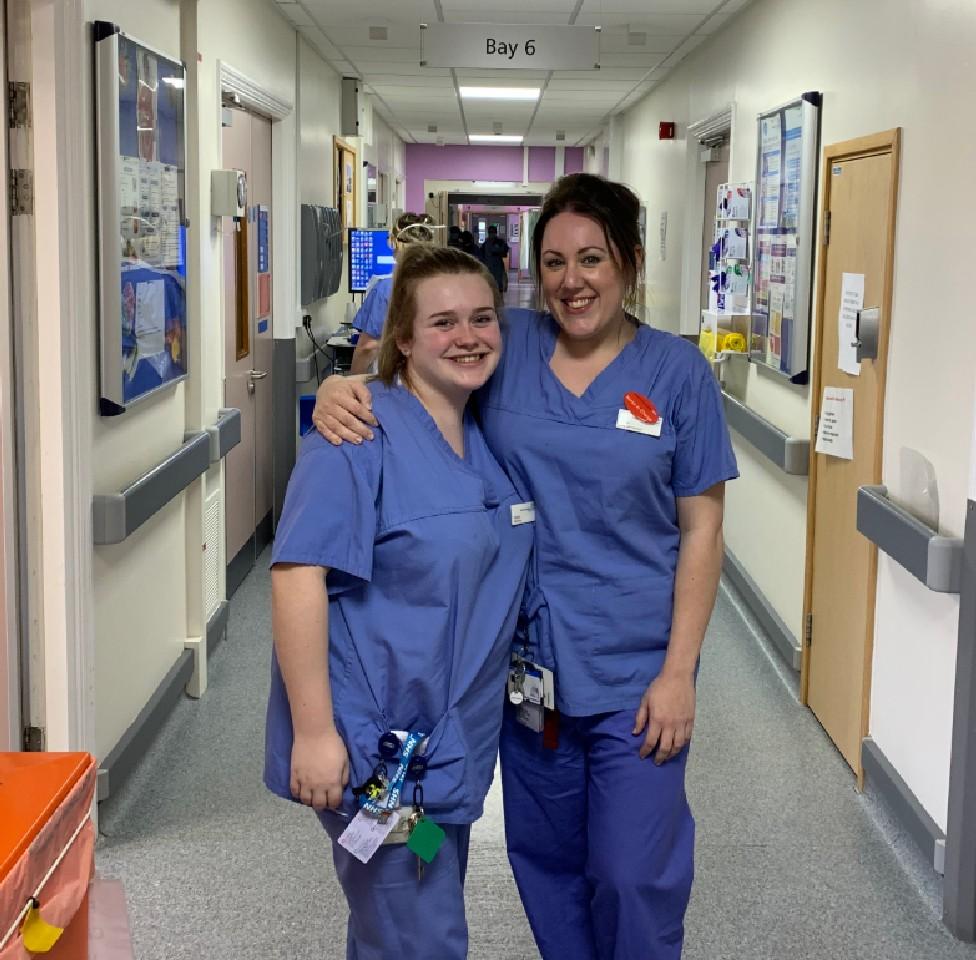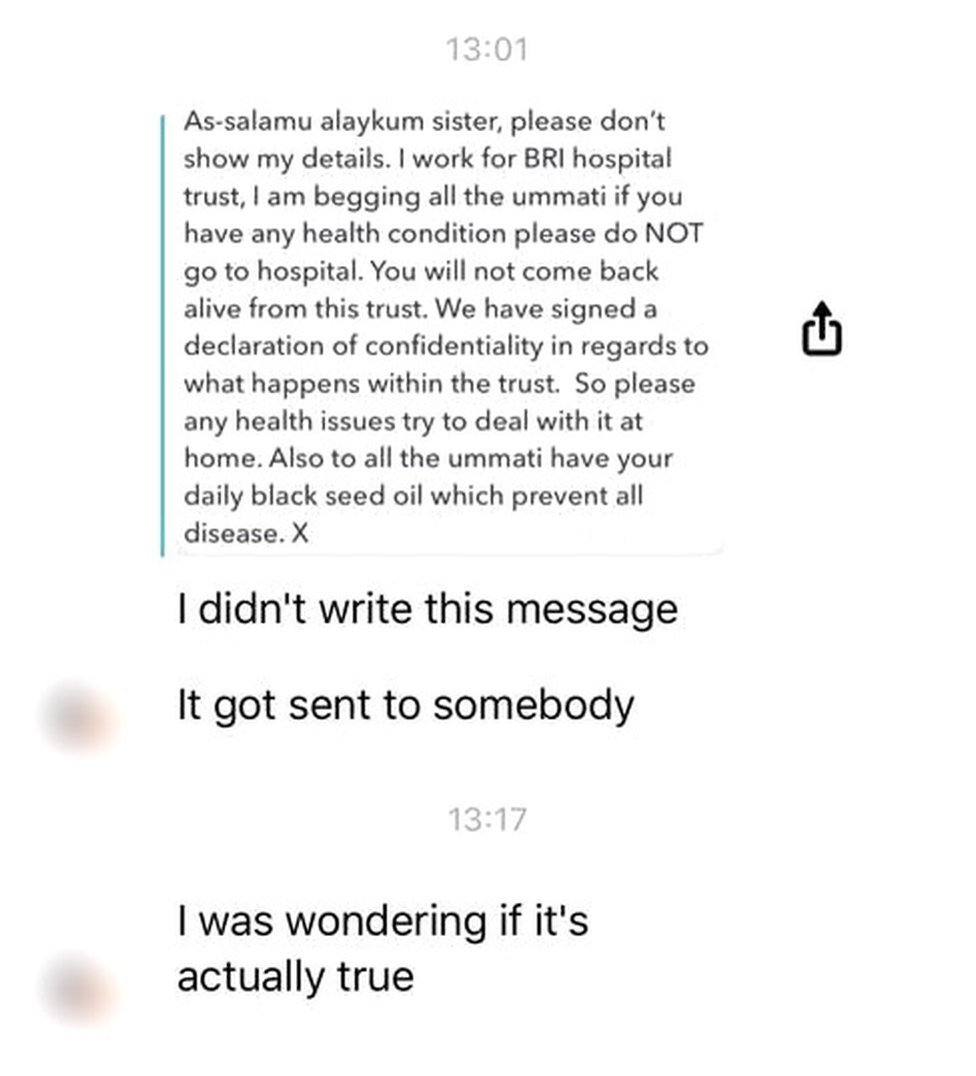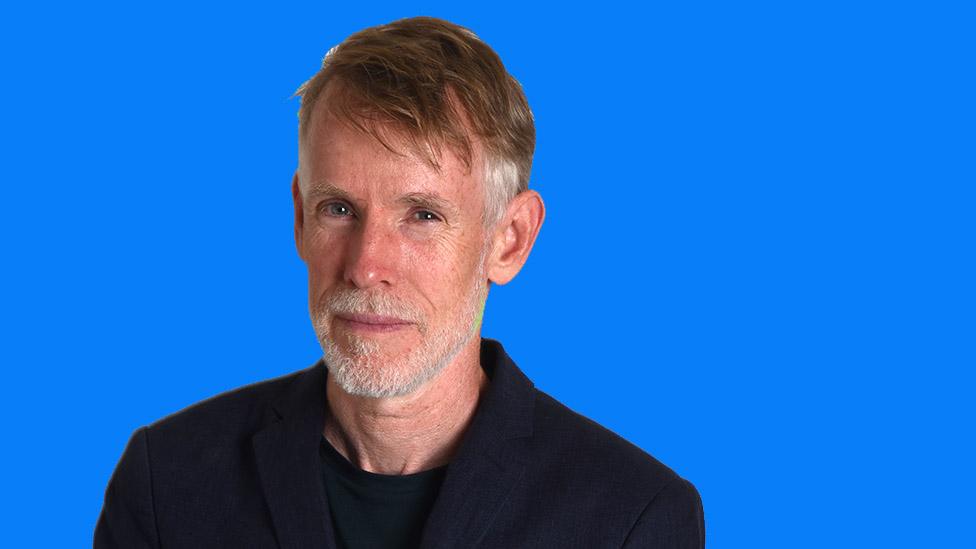Coronavirus doctor's diary: 'Fake news makes patients think we want them to die'
- Published

Nurses Sophie Bryant-Miles and Jennie Marshall-Hamad

Conspiracy theories have been spreading within parts of the BAME community that hospital staff want them to die, reports Dr John Wright of Bradford Royal Infirmary (BRI) - meanwhile, figures suggest an increase in deaths in the city outside hospital.
18 April 2020
There is a flurry of news stories about black, Asian and minority ethnic communities being at greater risk of dying from Covid-19, and this is a big concern in Bradford, where almost a third of our population is of South Asian heritage.
There are two factors at play here. The first is the increased risk of catching Covid-19 - living in more densely populated areas in overcrowded housing will be important risk factors. The second is the risk of adverse outcomes: diabetes, high blood pressure and heart disease have all been found to be risk factors, and these are much more common in our South Asian patients.
I know from my work in epidemics in Africa that where there is fear and panic, and patients become isolated from their families, it doesn't take long for rumours and fake news stories to start circulating.
In the Covid pandemic, smartphones and social media have connected families who are separated because of the risk of infection - but they've also helped generate a blizzard of dangerous fake news. In Bradford there are online reports that non-white patients admitted to the hospital are being left to die. Anonymous posts are shared thousands of times.
Here's one, which is totally false: "Please don't show my details. I work for BRI hospital trust. I am begging all the ummati [community], if you have any health condition please do NOT go to hospital. You will not come back alive from this trust… Also have your daily black seed oil which prevents all disease."


The effect of this kind of thing is being felt in the hospital, where we have noticed that some patients are scared to be admitted.
"I've had patients who want to self-discharge because they think we're trying to kill them. I've had a patient a couple of weeks ago, who wanted to self-discharge because her family was messaging her telling her that if she dies in our care, we won't tell them and we'll just burn her body. These are the things that are being spread around," a nurse, Sophie Bryant-Miles, tells me.
Sophie complained to Facebook about a group that she says was posting pictures of NHS staff - naming them, and accusing them of leaving people to die - but often such groups are able to continue operating under a different name, she says.
Ward manager Jennie Marshall-Hamad notes that the danger of such rumours is that they deter sick people from seeking medical help "and they will just die outside alone".
And in fact in Bradford we have figures that suggest death rates are going up, outside the hospital.

Front line diary

Prof John Wright, a medical doctor and epidemiologist, is head of the Bradford Institute for Health Research. He has looked after patients in epidemics all over the world, including outbreaks of cholera, HIV and ebola in sub-Saharan Africa. In this diary he is reporting for the BBC on how the Bradford Royal Infirmary is coping with Covid-19.
Read other recent posts:

Messages like the WhatsApp example above are in wide circulation and some have been sent to community workers like Ali Jan Haider, director of the Keeping Well At Home project in Bradford.
"I was receiving a number of WhatsApp messages that are quite alarming, because their tone was quite clear in the way they were criticising hospitals," he says.
"The overall message was saying to local people 'don't send your loved ones to hospital because if you do it, chances are they will not return home alive'.
"And some of the so-called accounts of what's really going on create suspicion - they are peppered with emotions, and quite a strong level of unhappiness about the way that their relatives have been treated by staff within the hospitals."
He says that some of these highly critical messages have come from influential people in the Muslim community, and even from an imam in the south of England. If someone already has misgivings about their local hospital this kind of messaging will "certainly make them think twice", he says.

Listen to John Wright
John Wright is recording from the hospital wards for BBC Radio 4's The NHS Front Line
You can hear the next episode at 11:00 on Tuesday 21 April, catch up with the previous episodes online, or download the podcast

It's natural for people to want to share any concerns they may have on WhatsApp or on Facebook, Ali Jan Haider concedes, but these messages worry him.
"My fear is, and my concern is, that quite a few of them could be unfounded, and I'm not even sure if they're authentic. They could be quite malicious or they could be there just to create panic and trepidation at a time when people are feeling very vulnerable," he says.
Some Asian doctors and nurses at Bradford Royal Infirmary are so worried about fake news scaring away people in their own community who need to be in hospital that they've started a counter-offensive, making short videos of themselves and their patients and posting them online.
Allow YouTube content?
This article contains content provided by Google YouTube. We ask for your permission before anything is loaded, as they may be using cookies and other technologies. You may want to read Google’s cookie policy, external and privacy policy, external before accepting. To view this content choose ‘accept and continue’.

Ali Jan Haider has been spreading the same reassuring message, though he is also keen to point out that most of the South Asian community in Bradford has no doubt about the good intentions of medical staff.
"The local community has been absolutely amazing in the way that it's been supporting the NHS staff in Bradford," he says. "We've had donations from parts of Bradford where we have communities that live on the edge of poverty, but they have dug deep, and they've been immensely supportive."
So the false news is coming from strange and isolated voices in the community, but it's still troubling, and the support of community leaders is very important.
Allow X content?
This article contains content provided by X. We ask for your permission before anything is loaded, as they may be using cookies and other technologies. You may want to read X’s cookie policy, external and privacy policy, external before accepting. To view this content choose ‘accept and continue’.
The president of the Bradford Council of Mosques, Zulfi Karim, has seen fake news of a different kind. In an earlier diary I pointed out that the city's mosques suspended gatherings without waiting for the government-imposed lockdown. But he has heard that Muslims are nonetheless being blamed for the spread of the virus.
"I have various concerns around the rise of Islamophobia and claims that this is a Muslim thing, that Muslims congregate more and that Ramadan is around the corner," he says.
"That is the message that's out there, and I think that's rubbish. I do think that Ramadan, this year, will be in isolation. I don't think there will be any public events. So I think there is a lot of fake news, which is really, really concerning for all of us."
He also worries about Islamophobic rhetoric arising from the news that members of the BAME community are more at risk of dying from Covid-19. The emphasis now should simply be on saving lives, supporting the NHS and making sure that everyone is getting fair and equal treatment, he says. But afterwards he would like to see more research to establish whether the reports are true, and investment to tackle the problem if they are.
Follow @docjohnwright, external on Twitter

A SIMPLE GUIDE: How do I protect myself?
AVOIDING CONTACT: The rules on self-isolation and exercise
LOOK-UP TOOL: Check cases in your area
MAPS AND CHARTS: Visual guide to the outbreak
